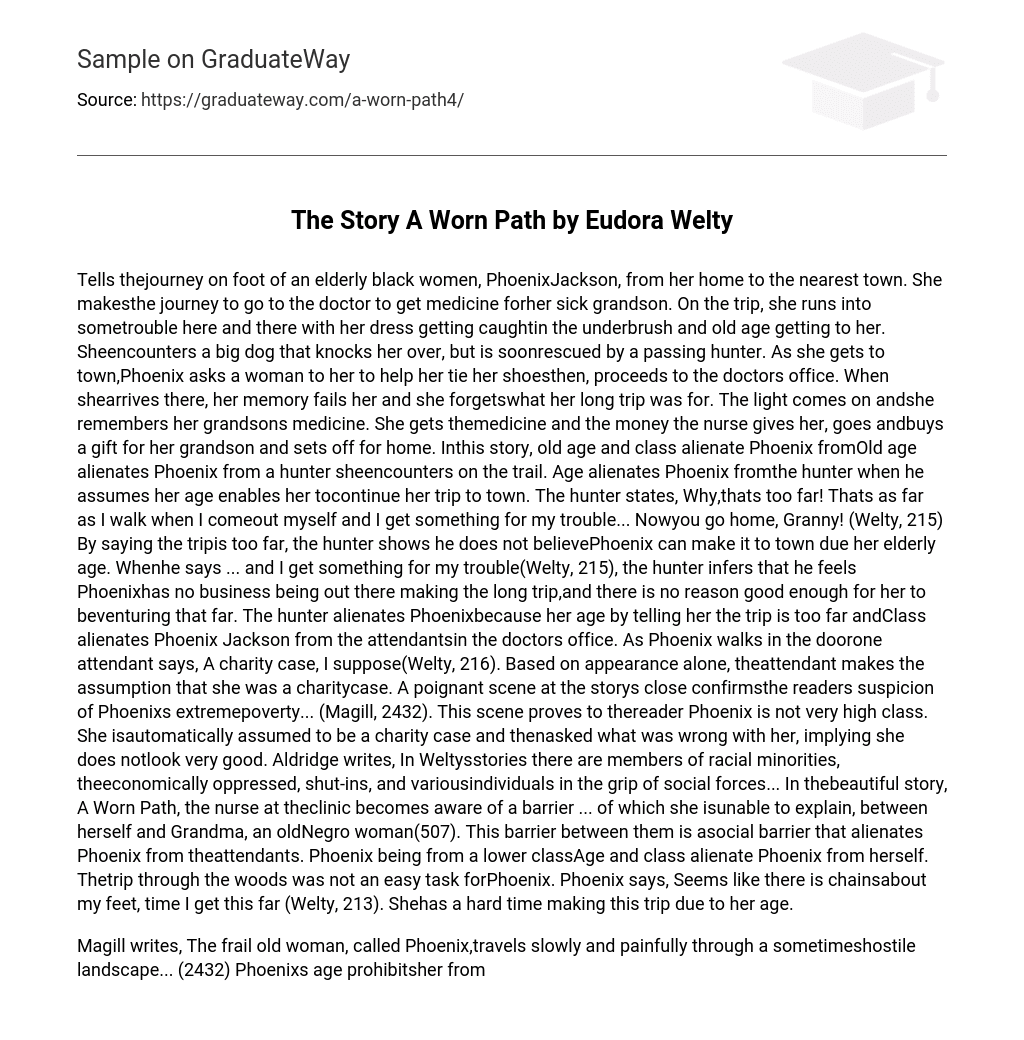This is the story of the journey on foot of an elderly Black woman, Phoenix Jackson, from her home to the nearest town. She makes the journey to go to the doctor to get medicine for her sick grandson. On the trip, she runs into some trouble here and there, with her dress getting caught in the underbrush and old age catching up with her. She encounters a big dog that knocks her over, but she is soon rescued by a passing hunter. As she gets to town, Phoenix asks a woman to help her tie her shoes, and then proceeds to the doctor’s office. When she arrives there, her memory fails her, and she forgets what her long trip was for. The light comes on, and she remembers her grandson’s medicine. She gets the medicine and the money the nurse gives her, goes and buys a gift for her grandson, and sets off for home.
In this story, old age and class alienate Phoenix from society. Old age alienates Phoenix from a hunter she encounters on the trail. Age alienates Phoenix from the hunter when he assumes that her age enables her to continue her trip to town. The hunter states, “Why, that’s too far! That’s as far as I walk when I come out myself, and I get something for my trouble… Now you go home, Granny!” (Welty, 215). By saying that the trip is too far, the hunter shows that he does not believe Phoenix can make it to town due to her elderly age. When he says “… and I get something for my trouble” (Welty, 215), the hunter infers that he feels Phoenix has no business being out there making the long trip, and there is no reason good enough for her to be venturing that far. The hunter alienates Phoenix because of her age by telling her that the trip is too far.
Class alienates Phoenix Jackson from the attendants in the doctor’s office. As Phoenix walks in the door, one attendant says, “A charity case, I suppose” (Welty, 216). Based on appearance alone, the attendant makes the assumption that Phoenix is a charity case. A poignant scene at the story’s close confirms the reader’s suspicion of Phoenix’s extreme poverty… (Magill, 2432). This scene proves to the reader that Phoenix is not very high class. She is automatically assumed to be a charity case and then asked what is wrong with her, implying that she does not look very good. Aldridge writes, “In Welty’s stories, there are members of racial minorities, the economically oppressed, shut-ins, and various individuals in the grip of social forces… In the beautiful story, ‘A Worn Path,’ the nurse at the clinic becomes aware of a barrier… of which she is unable to explain, between herself and Grandma, an old Negro woman” (507). This barrier between them is a social barrier that alienates Phoenix from the attendants. Phoenix, being from a lower class, experiences class alienation.
Age and class also alienate Phoenix from herself. The trip through the woods is not an easy task for Phoenix. Phoenix says, “Seems like there are chains about my feet, time I get this far” (Welty, 213). She has a hard time making this trip due to her age. Magill writes, “The frail old woman, called Phoenix, travels slowly and painfully through a sometimes hostile landscape…” (2432). Phoenix’s age prohibits her from easily making her journey that is so dear to her through the woods. The trip makes her so tired that she forgets the point of the whole trip.
As she gets to the doctor’s office, a fixed and ceremonial stiffness comes over her body (Welty, 216). Finally, the light flickers on and Phoenix remembers why she made the journey into town. Her memory is slowly fading with her age. Age and class alienate Phoenix. In Phoenix’s encounter with the hunter, trip into the woods, visit to the doctor’s office, and memory loss, age and class alienate her from society.
Bibliography:
- Aldridge, John W. Critiques and Essays on Modern Fiction 1920-1951. New York: The Ronald Press Company, 1952.
- Magill, Frank N. Eudora Welty. Critical Survey of Short Story Fiction. California: Salem Press, 1993, 2430-2439.
- Welty, Eudora. A Worn Path. Literature for Composition. 5th ed. Ed. Sylvan Barnet et al. New York: Longman, 2000.





